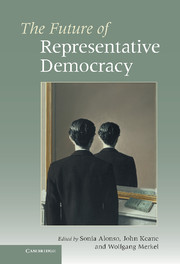Book contents
- Frontmatter
- Contents
- List of figures
- List of tables
- Notes on contributors
- Acknowledgements
- Editors' introduction: Rethinking the future of representative democracy
- 1 Representative democracy and its critics
- 2 Representative democracy and the populist temptation
- 3 The wider canvas: representation and democracy in state and society
- 4 Performance and deficits of present-day representation
- 5 Do parliaments have a future?
- 6 Engendering representative democracy
- 7 Representative democracy and the multinational demos
- 8 Diagnosing and designing democracy in Europe
- 9 Monitory democracy?
- 10 Representing nature
- 11 Democracy and representation beyond the nation state
- General bibliography
- Index
- References
4 - Performance and deficits of present-day representation
Published online by Cambridge University Press: 05 June 2012
- Frontmatter
- Contents
- List of figures
- List of tables
- Notes on contributors
- Acknowledgements
- Editors' introduction: Rethinking the future of representative democracy
- 1 Representative democracy and its critics
- 2 Representative democracy and the populist temptation
- 3 The wider canvas: representation and democracy in state and society
- 4 Performance and deficits of present-day representation
- 5 Do parliaments have a future?
- 6 Engendering representative democracy
- 7 Representative democracy and the multinational demos
- 8 Diagnosing and designing democracy in Europe
- 9 Monitory democracy?
- 10 Representing nature
- 11 Democracy and representation beyond the nation state
- General bibliography
- Index
- References
Summary
The problem
Many observers of democracy insist that political representation is in crisis; even books have been entitled accordingly (Köchler 1985; Hayward 1996). The debate and diagnosis is probably as old as democratic political representation itself (Pitkin 1967), but the more recent debate was stimulated by an increase of participatory demands, the so-called participatory revolution of the 1970s that led Habermas to conclude that ‘the grammar of politics is at stake’ (Habermas 1987). The demand side is one aspect of this alleged crisis. The other aspect is whether politics still has the capacity to deliver public goods and to solve problems in the face of economic globalisation. Some have concluded that representation is in crisis from two sides, and that their interaction is reinforcing the crisis: higher demands for participation and effective state control coincide with the decreasing capacity of representative institutions to deliver.
If this pessimistic claim is true, both input and output legitimacy are in danger, and democracy itself is in question. In this chapter, I shall bring some empirical evidence to bear on the question of the degree to which the grammar of politics is out of step with the demands and wishes of people. Many studies start at the very end of the political process evaluating the question of representation, namely by comparing outcomes with demands. However, it seems worthwhile evaluating the process of representation itself.
- Type
- Chapter
- Information
- The Future of Representative Democracy , pp. 96 - 123Publisher: Cambridge University PressPrint publication year: 2011
References
- 14
- Cited by



